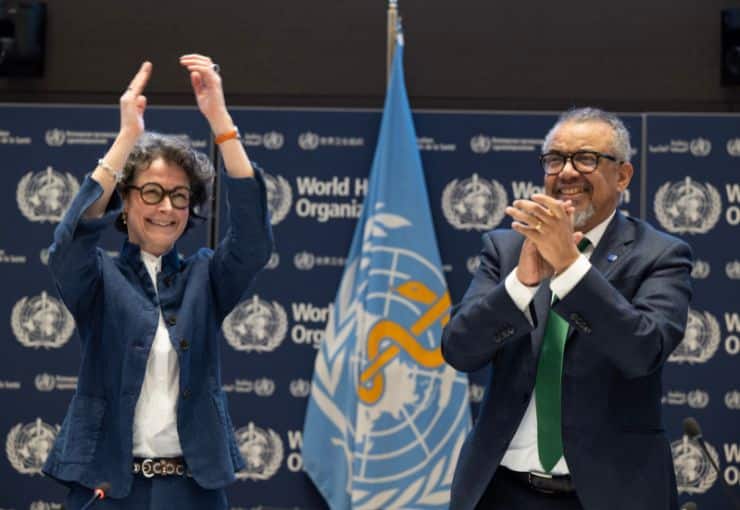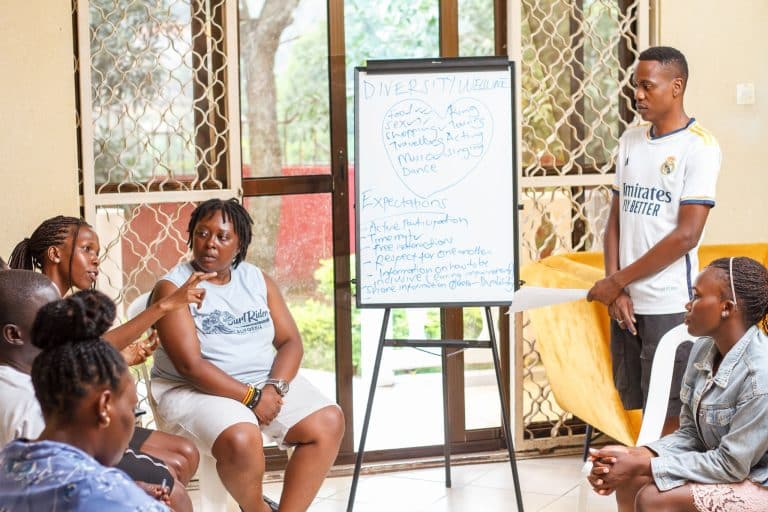More than 500 organisations and academics from 87 countries, including Wemos, have issued a statement today calling on the International Monetary Fund (IMF) to stop promoting austerity and instead support policies that advance gender justice, reduce inequality, and put people and planet first.
The IMF has already begun locking some countries into long term austerity-conditioned loans, while encouraging countries to take such recovery measures through its short-term, front loaded emergency financing packages. Such policies will further entrench gender and economic inequality and undermine any chance of an inclusive recovery, especially as many countries in the Global South are expected to need more long-term financing in the near future.
This statement comes ahead of the IMF and World Bank Annual Meetings slated to begin next week (12-18 October). Last week, during the Civil Society Policy Forum, Wemos co-organised and participated in a panel discussion titled ‘Fiscal Space for Universal Health and Social Protection after the COVID-19 Pandemic: How to Prevent Austerity’. Isabel Ortiz (Global Social Justice Program), David Archer (Action Aid), Emma Burgisser (Bretton Woods Project) and Myria Koutsoumpa (Wemos) discussed with Catherine Pattillo (IMF) and the audience about the IMF’s position regarding fiscal space and alternative ways to mobilise domestic resources for the social sector that urgently need to be explored, such as debt cancelation, issuing new Special Drawing Rights, and tackling illicit financial flows.
Myria Koutsoumpa, Global Health Advocate at Wemos: “The latest UNCTAD report estimated that Africa is losing USD 89 billion per year in illicit financial flows such as tax evasion and theft, amounting to more than it actually receives in development aid. The annual funding gap for the health-related SDGs for all low- and middle-income countries is less than that, at USD 54 billion. Universal health and other social goals need far more public resources.”
The statement
“We, the undersigned, call on the IMF to immediately stop promoting austerity around the world, and instead advocate policies that advance gender justice, reduce inequality, and decisively put people and planet first. As those who care about governments’ ability to fulfil human rights and advance progress towards the Sustainable Development Goals, we express the utmost alarm at the IMF’s advice for countries to return to austerity once the current crisis recedes. This pandemic has laid bare the deadly repercussions of systematically weak investments in health, education and social protection, hardest felt by marginalized populations including women, older people, racial and ethnic minorities, informal workers and low-income families. This crisis has also shone light on the shrinking of the middle classes and worsening gap between rich and poor.
The IMF has spoken repeatedly of the need for a fair and green recovery. It has said that economic and gender inequality, climate change, and poor governance can weaken growth and undermine stability. In recent years, it developed operational guidance for staff on embedding gender and economic inequality analysis into its work and approved a macroeconomic framework for social spending. All of this would suggest that the IMF is ready to use its influence and authority to support countries in reducing inequality.
And yet, despite this rhetoric and its own warnings of deepening inequality, the IMF has already started locking countries into new long-term austerity-conditioned loan programs in the past few months. Beyond the conditionality in these recent programs, we note that a significant number of the IMF’s COVID-19 emergency financing packages contain language promoting fiscal consolidation in the recovery phase. And with governments struggling to pay increased debt servicing and expected to continue to need extraordinary levels of external financing for years to come, IMF loan programs – and the conditions that accompany them – will play a highly influential role in shaping the economic and social landscape in the aftermath of this pandemic.
Fiscal consolidation driven austerity would only worsen poverty and inequality and undermine the achievement of economic and social rights. The IMF’s own research corroborates this. Time and time again, rigid and rapid fiscal consolidation conditioned in IMF programs has meant devastating cuts in health and education investments, losses of hard-earned pensions and social protections, public wage freezes, layoffs, and exacerbated unpaid care work burdens. In all cases, it is the most vulnerable people in societies who bear the brunt of these reforms, while the elite, large corporations and creditors enjoy the benefits. Aside from the direct impacts, fiscal consolidation doesn’t ensure economic recovery and the creation of new jobs, and rapid consolidation could instead deepen the downturn. It won’t deliver a just transition towards climate resilient economies either.
Instead of austerity cuts, it is critical to create fiscal space and give governments the time, flexibility and support to achieve a sustainable, inclusive and just recovery. Immediate and urgent steps are needed to support the financial health of countries through grants and other highly concessional financing, supporting debt cancellation and restructuring, and issuing a new allocation of Special Drawing Rights. Medium to longer term recovery efforts, however, should continue promoting further fiscal and policy space that allows for an increase, rather than a decrease, in social spending, and progressive tax policies that collect sufficient revenue and redistribute wealth fairly.
This means systematically assessing the impacts of fiscal policy reforms on gender and economic inequality and rejecting those that have negative social impacts. It means negotiating agreements transparently with input from a range of stakeholders including civil society through national social dialogue. It means recommending and promoting progressive tax reforms such as taxes on wealth and the excess profits of large corporations, meaningfully combatting tax evasion, avoidance and illicit financial flows. And it means systematically supporting governments to restructure their debts so that they can prioritize investments in quality public services.
The global economy stands at a crossroads between further decades of austerity and debt crises, or adopting a macroeconomic framework compatible with fighting inequality, pursuing climate justice, realizing human rights and achieving the Sustainable Development Goals. Ahead of the 2020 IMF Annual Meetings, we call on the IMF to turn away from the mistakes of the past and finally close the dark chapter on IMF-conditioned austerity for good.”
This statement is also available in French, Spanish and Arabic.
Photo: Protesting Austerity by shaunl from Getty Images Signature via Canva




